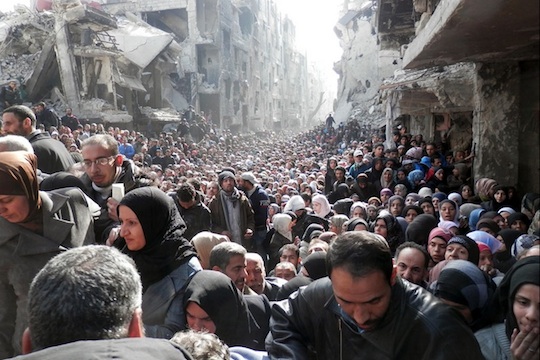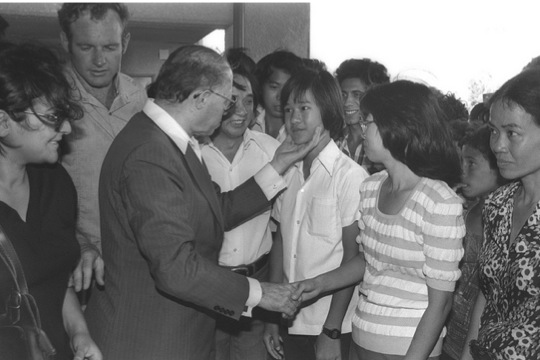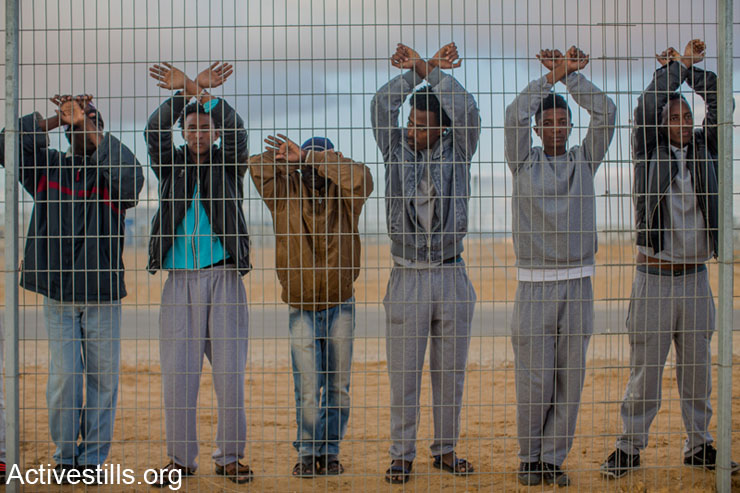There’s no reason contributing solutions needs to be scary. Here are four viable steps Israel can take that will actually help the various refugee populations in its midst.
Israeli politicians and prominent figures in the local media have begun paying attention to the refugee crisis playing out in Europe in recent days.
Well, actually, that’s a misnomer. Europe is starting to pay attention to the Syrian refugee crisis because massive numbers of Syrian refugees are now arriving on its shores and borders.
In recent days, one set of prominent figures has called on the Israeli government to start absorbing in a symbolic number of Syrian refugees. The country’s prime minister and another group of politicians rejected the idea out of hand.
Here are four things Israel can do for the — various groups of — refugees in its midst that everyone should be able to live with.
1. Let Palestinian refugees in Syria to come to the West Bank

A significant number of those fleeing Syria are Palestinian refugees who have been living in refugee camps there for decades. We came to know about some of those camps, like Yarmouk, as they faced unimaginable blockades and attacks in recent months and years. Others long ago fled to Turkey, Lebanon, Jordan and Europe.
Nearly three years ago Palestinian President Mahmoud Abbas, with help from the United Nations, asked Israel to allow him to settle some Palestinian refugees from Syria in the West Bank. Mind you, Israel controls Palestine’s borders and population registry, so Abbas needs Israeli permission to give anybody, let alone an entire, population permanent — or even temporary — status in Palestine.
Israel responded with a trick answer. You can bring the refugees from Syria into the West Bank and Gaza, Netanyahu’s government reportedly responded at the time, as long as each and every one of them signs away their right of return to the cities and villages they fled and were forced from in 1948.
Abbas, unsurprisingly, said no. There is no Palestinian leader today who has the political capital to abrogate even one refugee’s right of return. Abbas, the “best partner Israel will ever have,” announced that he was waiving his own right of return a few years ago and he paid a huge political price. (Abbas is from Safed, deep inside Israel proper.) Netanyahu, “Mr. No Preconditions,” probably thought he was being pretty clever.
Abbas asked the UN for help in convincing Israel to allow Palestinian refugees from Syria to resettle in the West Bank again this week. Israel could easily say yes this time without the deal-breaking pre-condition about the right of return. In this case it’s okay to leave intractable elements of the peace process to the intractable peace process itself, not as pre-conditions for saving thousands of lives.
2. Start referring to non-Jewish refugees as refugees

Israel does not grant asylum to non-Jews. There are a handful or exceptions, of course, but they amount to fewer than 1,000 people in the country’s 67-year existence. There were the several hundred Vietnamese boat people Menachem Begin took in during the late 1970s, and there were the first several hundred Darfurian asylum seekers to arrive in the mid-2000s who were given residency (after a spending serious time in prison).
Aside from those groups and a few isolated individuals, there is no such thing as a non-Jewish refugee in Israel. As far as the mainstream — and official — Israeli discourse is concerned, Palestinian refugees are not real refugees: they are artificial refugees or “infiltrators.” Once the African asylum seekers began arriving in larger numbers, too, even those from Darfur stopped being referred to as refugees and became infiltrators.
The reasoning for this is easy to understand. One might expect a country built as a safe haven for refugees to have a difficult time turning away refugees seeking shelter from atrocities and persecution. If you refuse to call them refugees, however, turning them away becomes a lot easier. It’s pretty easy to justify building a massive hi-tech fence to keep infiltrators out; less so if they’re refugees.
3. Build a sincere asylum regime for those already in Israel

More than anything else, the single most problematic aspect of the way Israel treats African asylum seekers is that it doesn’t treat their asylum claims seriously. In fact, only after years of court battles did Israel even begin accepting and processing asylum claims from Sudanese and Eritreans.
The Interior Ministry is now dragging its feet on those asylum claims it has received, and there is serious concern that the policies it is implementing are designed to pressure all asylum seekers to leave the country, not to identify and protect bona fide refugees.
Before anything else, Israel must implement a refugee regime that gives asylum seekers a fair and real chance at showing they have a well-founded fear of persecution, and one that provides them with refugee and the accompanying legal status if they are able to. Any policy change that doesn’t address this fundamental flaw is nothing more than a Band-Aid.
4. Start talking about real solutions for Palestinian refugees

Israel was created to give safe haven to millions of refugees, and as an unfortunate consequence, it created a whole new refugee problem of similar proportions. Until Israel accepts responsibility for its role in the Palestinian refugee problem and steps up in resolving it, there will always be a cloud of injustice and disingenuousness hanging over any discussion of refugees.
There is no prescribed solution for the Palestinian refugee problem. Palestinian refugees have been mistreated and abused and kept in limbo by nearly every state in the Middle East, including but not even remotely limited to Israel. Palestinians who have lived in Lebanon and Syria, and to some degree in Jordan, are to this day denied citizenship and basic rights.
Even Palestinian refugees living under the direct control of the Palestinian Authority are still living in squalid refugee camps. There have to be better short-term solutions that provide opportunities for integration, resettlement and the basic rights and dignity every human being deserves.
There must also be a discussion in Israel about what role it can play in resolving the Palestinian refugee problem. Doing so cannot merely be a concession extracted in peace talks. Israel must think creatively about how it can absorb some Palestinian refugees, how it can support the occupied State of Palestine in absorbing others, and begin formulating reparations plans for those who choose not to return to either state.
First and foremost, both in terms of chronology and importance, Israel must accept its responsibility in the creation of the Palestinian refugee problem. It needn’t necessarily be framed in terms of right and wrong and us and them, but as a matter of conciliation, both with itself and with the refugees.


